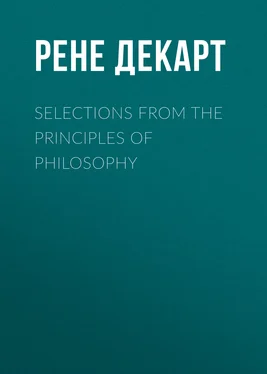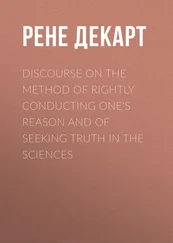Рене Декарт - Selections from the Principles of Philosophy
Здесь есть возможность читать онлайн «Рене Декарт - Selections from the Principles of Philosophy» — ознакомительный отрывок электронной книги совершенно бесплатно, а после прочтения отрывка купить полную версию. В некоторых случаях можно слушать аудио, скачать через торрент в формате fb2 и присутствует краткое содержание. Жанр: foreign_antique, Философия, foreign_edu, на английском языке. Описание произведения, (предисловие) а так же отзывы посетителей доступны на портале библиотеки ЛибКат.
- Название:Selections from the Principles of Philosophy
- Автор:
- Жанр:
- Год:неизвестен
- ISBN:нет данных
- Рейтинг книги:4 / 5. Голосов: 1
-
Избранное:Добавить в избранное
- Отзывы:
-
Ваша оценка:
- 80
- 1
- 2
- 3
- 4
- 5
Selections from the Principles of Philosophy: краткое содержание, описание и аннотация
Предлагаем к чтению аннотацию, описание, краткое содержание или предисловие (зависит от того, что написал сам автор книги «Selections from the Principles of Philosophy»). Если вы не нашли необходимую информацию о книге — напишите в комментариях, мы постараемся отыскать её.
Selections from the Principles of Philosophy — читать онлайн ознакомительный отрывок
Ниже представлен текст книги, разбитый по страницам. Система сохранения места последней прочитанной страницы, позволяет с удобством читать онлайн бесплатно книгу «Selections from the Principles of Philosophy», без необходимости каждый раз заново искать на чём Вы остановились. Поставьте закладку, и сможете в любой момент перейти на страницу, на которой закончили чтение.
Интервал:
Закладка:
René Descartes
Selections from the Principles of Philosophy
LETTER OF THE AUTHOR
TO THE FRENCH TRANSLATOR OF THE PRINCIPLES OF PHILOSOPHY SERVING FOR A PREFACE
Sir,—The version of my principles which you have been at pains to make, is so elegant and finished as to lead me to expect that the work will be more generally read in French than in Latin, and better understood. The only apprehension I entertain is lest the title should deter some who have not been brought up to letters, or with whom philosophy is in bad repute, because the kind they were taught has proved unsatisfactory; and this makes me think that it will be useful to add a preface to it for the purpose of showing what the MATTER of the work is, what END I had in view in writing it, and what UTILITY may be derived from it. But although it might be my part to write a preface of this nature, seeing I ought to know those particulars better than any other person, I cannot nevertheless prevail upon myself to do anything more than merely to give a summary of the chief points that fall, as I think, to be discussed in it: and I leave it to your discretion to present to the public such part of them as you shall judge proper.
I should have desired, in the first place, to explain in it what philosophy is, by commencing with the most common matters, as, for example, that the word PHILOSOPHY signifies the study of wisdom, and that by wisdom is to be understood not merely prudence in the management of affairs, but a perfect knowledge of all that man can know, as well for the conduct of his life as for the preservation of his health and the discovery of all the arts, and that knowledge to subserve these ends must necessarily be deduced from first causes; so that in order to study the acquisition of it (which is properly called philosophizing), we must commence with the investigation of those first causes which are called PRINCIPLES. Now these principles must possess TWO CONDITIONS: in the first place, they must be so clear and evident that the human mind, when it attentively considers them, cannot doubt of their truth; in the second place, the knowledge of other things must be so dependent on them as that though the principles themselves may indeed be known apart from what depends on them, the latter cannot nevertheless be known apart from the former. It will accordingly be necessary thereafter to endeavour so to deduce from those principles the knowledge of the things that depend on them, as that there may be nothing in the whole series of deductions which is not perfectly manifest. God is in truth the only being who is absolutely wise, that is, who possesses a perfect knowledge of all things; but we may say that men are more or less wise as their knowledge of the most important truths is greater or less. And I am confident that there is nothing, in what I have now said, in which all the learned do not concur.
I should, in the next place, have proposed to consider the utility of philosophy, and at the same time have shown that, since it embraces all that the human mind can know, we ought to believe that it is by it we are distinguished from savages and barbarians, and that the civilisation and culture of a nation is regulated by the degree in which true philosophy nourishes in it, and, accordingly, that to contain true philosophers is the highest privilege a state can enjoy. Besides this, I should have shown that, as regards individuals, it is not only useful for each man to have intercourse with those who apply themselves to this study, but that it is incomparably better he should himself direct his attention to it; just as it is doubtless to be preferred that a man should make use of his own eyes to direct his steps, and enjoy by means of the same the beauties of colour and light, than that he should blindly follow the guidance of another; though the latter course is certainly better than to have the eyes closed with no guide except one's self. But to live without philosophizing is in truth the same as keeping the eyes closed without attempting to open them; and the pleasure of seeing all that sight discloses is not to be compared with the satisfaction afforded by the discoveries of philosophy. And, finally, this study is more imperatively requisite for the regulation of our manners, and for conducting us through life, than is the use of our eyes for directing our steps. The brutes, which have only their bodies to conserve, are continually occupied in seeking sources of nourishment; but men, of whom the chief part is the mind, ought to make the search after wisdom their principal care, for wisdom is the true nourishment of the mind; and I feel assured, moreover, that there are very many who would not fail in the search, if they would but hope for success in it, and knew the degree of their capabilities for it. There is no mind, how ignoble soever it be, which remains so firmly bound up in the objects of the senses, as not sometime or other to turn itself away from them in the aspiration after some higher good, although not knowing frequently wherein that good consists. The greatest favourites of fortune—those who have health, honours, and riches in abundance— are not more exempt from aspirations of this nature than others; nay, I am persuaded that these are the persons who sigh the most deeply after another good greater and more perfect still than any they already possess. But the supreme good, considered by natural reason without the light of faith, is nothing more than the knowledge of truth through its first causes, in other words, the wisdom of which philosophy is the study. And, as all these particulars are indisputably true, all that is required to gain assent to their truth is that they be well stated.
But as one is restrained from assenting to these doctrines by experience, which shows that they who make pretensions to philosophy are often less wise and reasonable than others who never applied themselves to the study, I should have here shortly explained wherein consists all the science we now possess, and what are the degrees of wisdom at which we have arrived. The first degree contains only notions so clear of themselves that they can be acquired without meditation; the second comprehends all that the experience of the senses dictates; the third, that which the conversation of other men teaches us; to which may be added as the fourth, the reading, not of all books, but especially of such as have been written by persons capable of conveying proper instruction, for it is a species of conversation we hold with their authors. And it seems to me that all the wisdom we in ordinary possess is acquired only in these four ways; for I do not class divine revelation among them, because it does not conduct us by degrees, but elevates us at once to an infallible faith.
There have been, indeed, in all ages great minds who endeavoured to find a fifth road to wisdom, incomparably more sure and elevated than the other four. The path they essayed was the search of first causes and true principles, from which might be deduced the reasons of all that can be known by man; and it is to them the appellation of philosophers has been more especially accorded. I am not aware that there is any one of them up to the present who has succeeded in this enterprise. The first and chief whose writings we possess are Plato and Aristotle, between whom there was no difference, except that the former, following in the footsteps of his master, Socrates, ingenuously confessed that he had never yet been able to find anything certain, and that he was contented to write what seemed to him probable, imagining, for this end, certain principles by which he endeavoured to account for the other things. Aristotle, on the other hand, characterised by less candour, although for twenty years the disciple of Plato, and with no principles beyond those of his master, completely reversed his mode of putting them, and proposed as true and certain what it is probable he himself never esteemed as such. But these two men had acquired much judgment and wisdom by the four preceding means, qualities which raised their authority very high, so much so that those who succeeded them were willing rather to acquiesce in their opinions, than to seek better for themselves. The chief question among their disciples, however, was as to whether we ought to doubt of all things or hold some as certain,—a dispute which led them on both sides into extravagant errors; for a part of those who were for doubt, extended it even to the actions of life, to the neglect of the most ordinary rules required for its conduct; those, on the other hand, who maintained the doctrine of certainty, supposing that it must depend upon the senses, trusted entirely to them. To such an extent was this carried by Epicurus, that it is said he ventured to affirm, contrary to all the reasonings of the astronomers, that the sun is no larger than it appears.
Читать дальшеИнтервал:
Закладка:
Похожие книги на «Selections from the Principles of Philosophy»
Представляем Вашему вниманию похожие книги на «Selections from the Principles of Philosophy» списком для выбора. Мы отобрали схожую по названию и смыслу литературу в надежде предоставить читателям больше вариантов отыскать новые, интересные, ещё непрочитанные произведения.
Обсуждение, отзывы о книге «Selections from the Principles of Philosophy» и просто собственные мнения читателей. Оставьте ваши комментарии, напишите, что Вы думаете о произведении, его смысле или главных героях. Укажите что конкретно понравилось, а что нет, и почему Вы так считаете.












